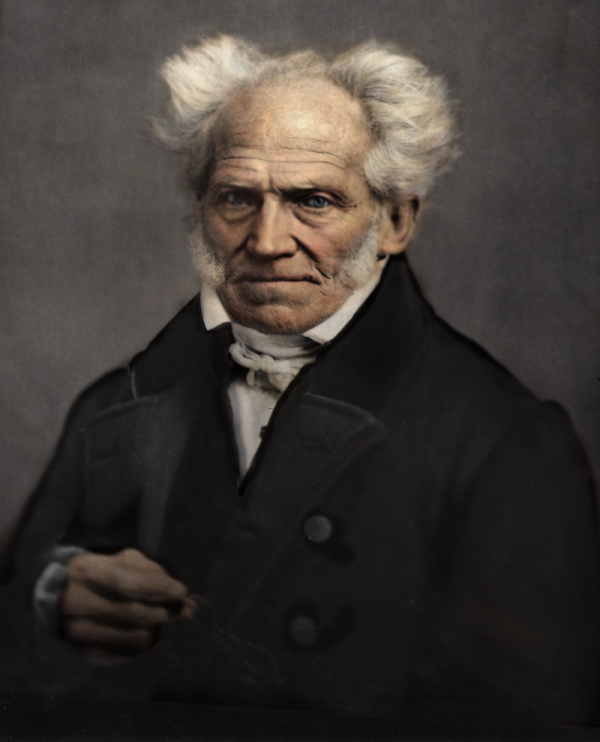
If I were to employ a Schopenhauerian critique on consumer culture it would be how capitalism exploits the striving will inherent in the human condition.
“All striving comes from lack, from a dissatisfaction with one’s condition, and is thus suffering as long as it is not satisfied; but no satisfaction is lasting; instead, it is only the beginning of a new striving.”
What Schopenhauer is describing—in his own idiosyncratic way—is the reward behaviour, a fundamental mode of human behaviour that ensures human beings secure resources for their survival. Capitalism preys on this very ‘dissatisfaction with one’s condition’ because it promises to alleviate that dissatisfaction with an endless variety of products to choose from off the shelf sold on the market. Consumers crave distraction and they’ll gladly part with their money for the sake of stimulation and temporary relief from their discontent. Certainly capitalism hears their clamouring for more and rubs its hands with entrepreneurial glee. When a new market arises or a demand emerges, sellers quickly invest their capital to cater to that demand, and what was once an intangible desire transforms into a concrete reality available for purchase. An ideal want then becomes a tangible reality; for the right price of course!
Here Schopenahauer offers more insight into the striving of the will:
“To begin with, I would like to recall the discussion from the end of the Second Book, a discussion that was occasioned by the question raised there about the goal and purpose of the will; rather than answering this question, we saw how the will, at all levels of its appearance, from the lowest up to the highest, forgoes entirely any final goal or purpose. It is always striving, because striving is its only essence, and is not brought to an end by reaching any goal; it is therefore not capable of any ultimate satisfaction; obstacles can only detain it, while in itself it goes on to infinity.”
This cycle of striving and temporary satisfaction is emblematic of consumer culture. I once witnessed a group of bespectacled, bearded men eagerly heading to the cinema to indulge in the latest Marvel movie, becoming active participants in the consumption of products. As they shuffled along to find their designated seats, a sense of accomplishment filled the air – ‘the goal is reached.’ Settling into their premium seats, their eyes darted towards the big screen, affirming the living reality they were about to experience. From start to finish, they were entertained, their satisfaction evident. However, just as all beginnings have endings, their departure from the cinema foyer left them pondering, ‘what to do next?’
The quest for fulfilment through material possessions, services, or experiences is an endless pursuit within consumer culture. The transient and fleeting nature of satisfaction becomes apparent as one desire is fulfilled, only to be replaced by another. The passage of time renders a product mundane, new models are released, and competitors introduce better alternatives. These are some of the reasons why no single product can indefinitely satisfy the striving will. The market must continuously innovate to maintain consumer interest, as failure to do so risks losing that very interest. Market research becomes indispensable, driven by the desire for instant gratification and the allure of consumer culture.
Capitalism is an economic system skilled in motivated reward-seeking behaviour. It harnesses the inherent striving will within individuals and transforms it into a driving force for consumption. Through its promise of alleviating dissatisfaction and providing endless choices, capitalism entices consumers to continually seek fulfilment through material possessions, services, and experiences. However, as we have explored earlier through the lens of Schopenhauer’s philosophy, this quest for satisfaction is like a bottomless pit. No single product or experience can truly satisfy the striving will indefinitely. The cycle of striving and temporary satisfaction persists, driven by the transient nature of desires and the constant evolution of markets.
Consumer culture thrives on this perpetual cycle. It is a cultural framework that places immense importance on purchasing and owning products as a means of personal expression, social status, and fulfilment. But it is crucial to for us to recognise from a Schopenhauerian perspective that the satisfaction gained from consumer culture is fleeting and transitory, often leaving individuals yearning for the next desirable thing.
To maintain consumer interest, capitalism relies on continuous innovation and market research. It caters to the desire for instant gratification and adapts to the ever-changing demands of consumers. This constant evolution perpetuates the cycle of consumption, making it challenging for individuals to find lasting contentment in their possessions or experiences. It capitalises on our longing for satisfaction, offering a multitude of choices and promises of fulfilment. However, it is essential to acknowledge the transitory nature of satisfaction within consumer culture and the perpetual cycle of striving and temporary relief.
Capitalism’s exploitation of the striving will inherent in the human condition is a driving force behind consumer culture and is a clever master manipulator, exploiting our deepest desires and driving us headfirst into the arms of consumer culture. It knows just how to tap into our insatiable longing for satisfaction, dangling an array of choices and promises of fulfilment right before our eyes. But let’s not be fooled by the glittering façade, we must be wise by cultivating awareness and allow ourselves to have the option to seek fulfilment beyond material possessions, thereby we can find a more sustainable path to contentment and meaning in our lives.

